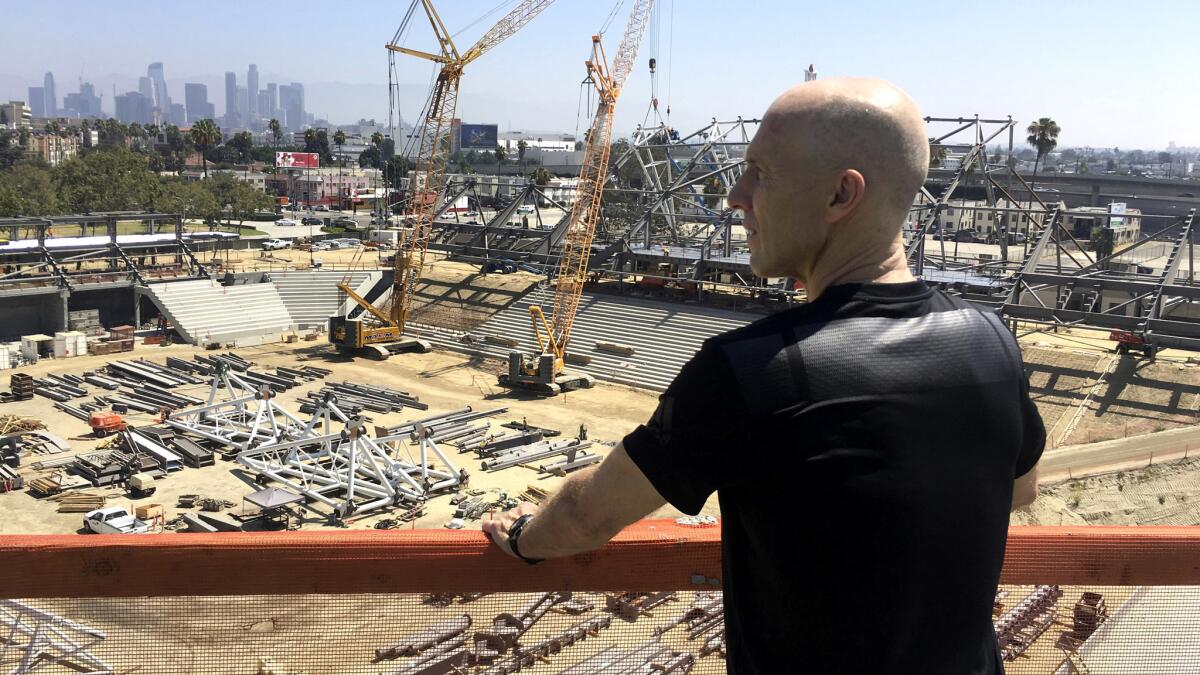Bob Bradley to tackle assignment of melding fantasy with reality for LAFC

- Share via
In retrospect, the plan was borderline genius. Before the Los Angeles Football Club had any players, it started to sell its brand. What it was really selling was an idea, specifically the idea that this franchise would be different from any other franchise in Major League Soccer.
The blank roster was part of the magic, as there weren’t any names to remind potential customers of how the team would be an MLS team bound by MLS rules that would almost certainly play like an MLS team. And it worked, with more than 17,000 fans placing deposits for season tickets for the team’s inaugural season in 2018.
LAFC has a slick logo and stylish merchandise. The team will play in a new state-of-the-art soccer-specific stadium next to the Coliseum. The ownership group includes Magic Johnson, Will Ferrell, Mia Hamm and Tony Robbins.
How can the on-field product possibly live up to any of this?
Watch any of the cinematic videos posted to the team’s social media accounts or listen to any of the romantic language used by executives to describe the franchise’s long-term vision and you would expect them to play like Barcelona.
“To look in the direction of top teams and say, ‘That’s what we want to be,’ ‘That’s the kind of football we want to play,’ that’s a good thing,” Bob Bradley said.
Bradley was hired this week to coach the team, but what he was really hired to do was bridge fantasy and reality, which, frankly, feels almost impossible. Introduced at a Friday news conference, Bradley was careful not to make any short-term promises he won’t be able to deliver.
He spoke of the future, of wanting his team to play with an attractive style, of wanting LAFC to transcend soccer and become as important to the city as the Lakers or Dodgers. He declined to place a timeline on any of this.
“Sometimes things come together quicker, sometimes they take time,” he said. “The commitment to the vision is key.”
How teams are built in MLS has changed over the years, in some ways for the better, in some ways for the worse.
Teams willing to pay a premium for world-class players are free to do so, which is why the high-end talent in the league is better than it’s ever been. A player of the quality and age of Toronto FC’s Sebastian Giovinco would have never come to MLS a decade ago.
The league has also expanded at an alarming rate, however. When Bradley last coached in MLS, in 2006, there were only 12 teams. When LAFC starts playing next season, there will be 23 teams. As a result, what was already a modest pool of talent has been further diluted.
This isn’t basketball, where a team can move the ball to a LeBron James and clear out the side. One technically inept player on the field can disrupt ball movement. Replace one or two Barcelona midfielders with MLS run-of-the-mill players and Barcelona wouldn’t play like Barcelona.
“Look, the way the league has grown still, on a business side, has helped,” Bradley said. “And therefore it motivates and challenges the fact that now we must keep up with developing players. I understand when you add more teams sometimes, initially, that might mean some players might get spread out a little bit more.”
How long will it take for the talent to catch up to the infrastructure? Who knows?
The difficulty of realizing oversized ambitions in this league has been illustrated by one of the two most recent expansion teams, Atlanta FC.
Atlanta, which started play this season, appointed as coach Tata Martino, the former coach of Argentina’s national team. The franchise made a significant investment in a young No. 10, Miguel Almiron of Paraguay. The team plays with an attacking mind-set.
If Atlanta isn’t the league’s most fun team to watch, it’s close. But it’s also in fourth place in the Eastern Conference and hasn’t changed the way anyone thinks of MLS.
Bradley has the right temperament to deal with this situation. He’s always been something of a dreamer, a trait that inspired his greatest triumphs as the coach of the U.S. national team, as well as his most painful defeats.
After he was dismissed by U.S. Soccer in 2011, he wandered the globe, taking one seemingly hopeless job after another, only to find surprising levels of success. Last year, he became the first American to coach in the English Premier League.
His task now is as formidable as any he’s ever accepted. His plans extend beyond coaching LAFC’s first team, as he said he wants to develop a style and philosophy representative of Los Angeles that is taught at every ladder of the organization, from the franchise’s United Soccer League affiliate in Orange County to youth academy teams.
This will take time. Bradley knows that. The question is whether the team’s owners and fans know that too.
Follow Dylan Hernandez on Twitter @dylanohernandez
More to Read
Go beyond the scoreboard
Get the latest on L.A.'s teams in the daily Sports Report newsletter.
You may occasionally receive promotional content from the Los Angeles Times.











